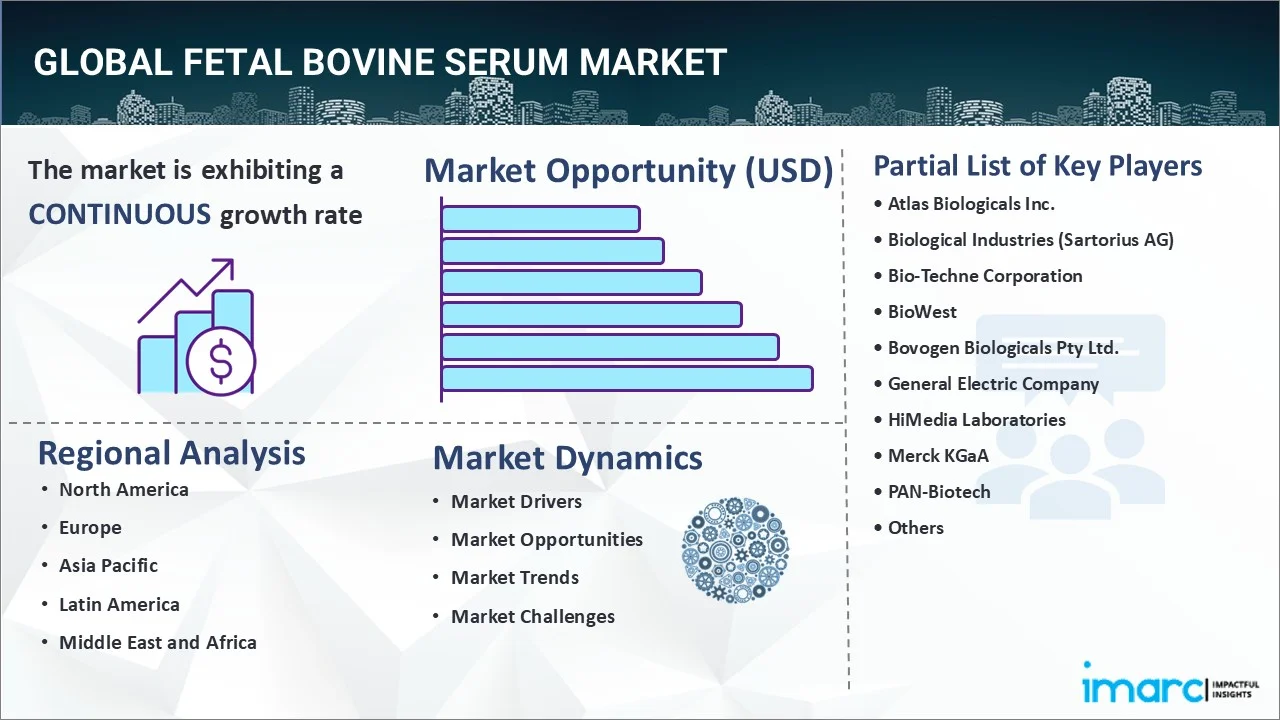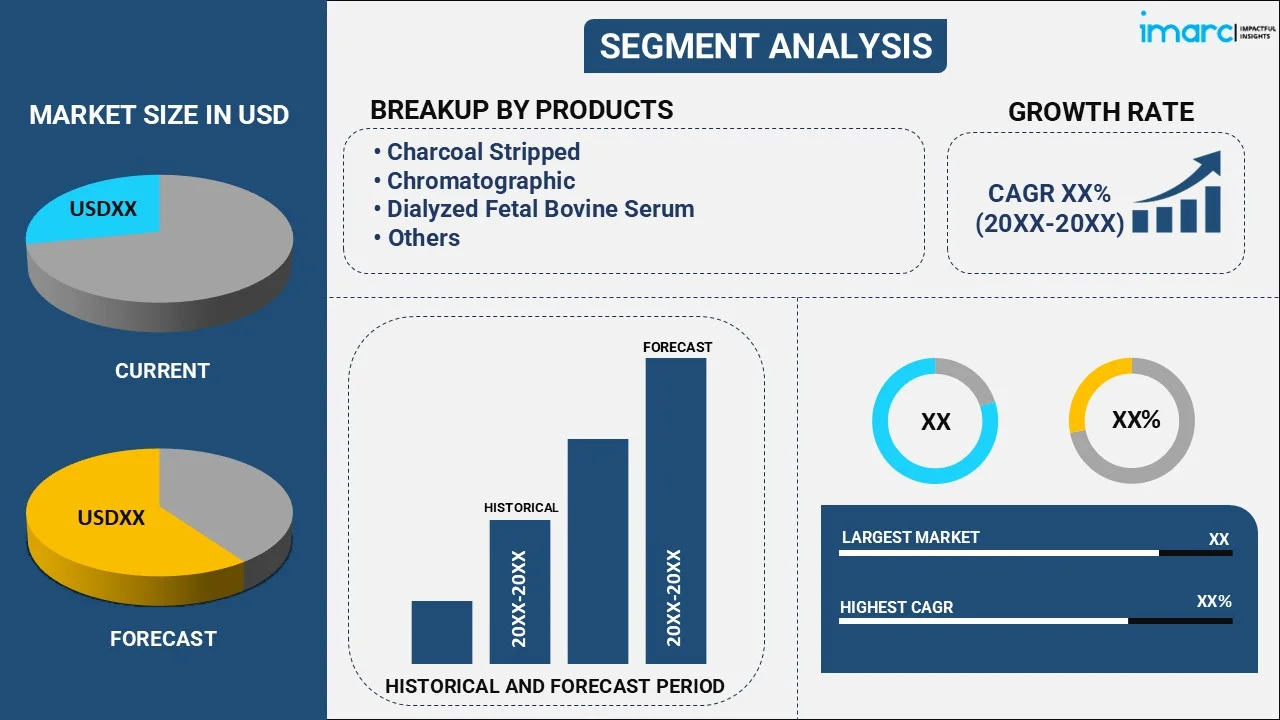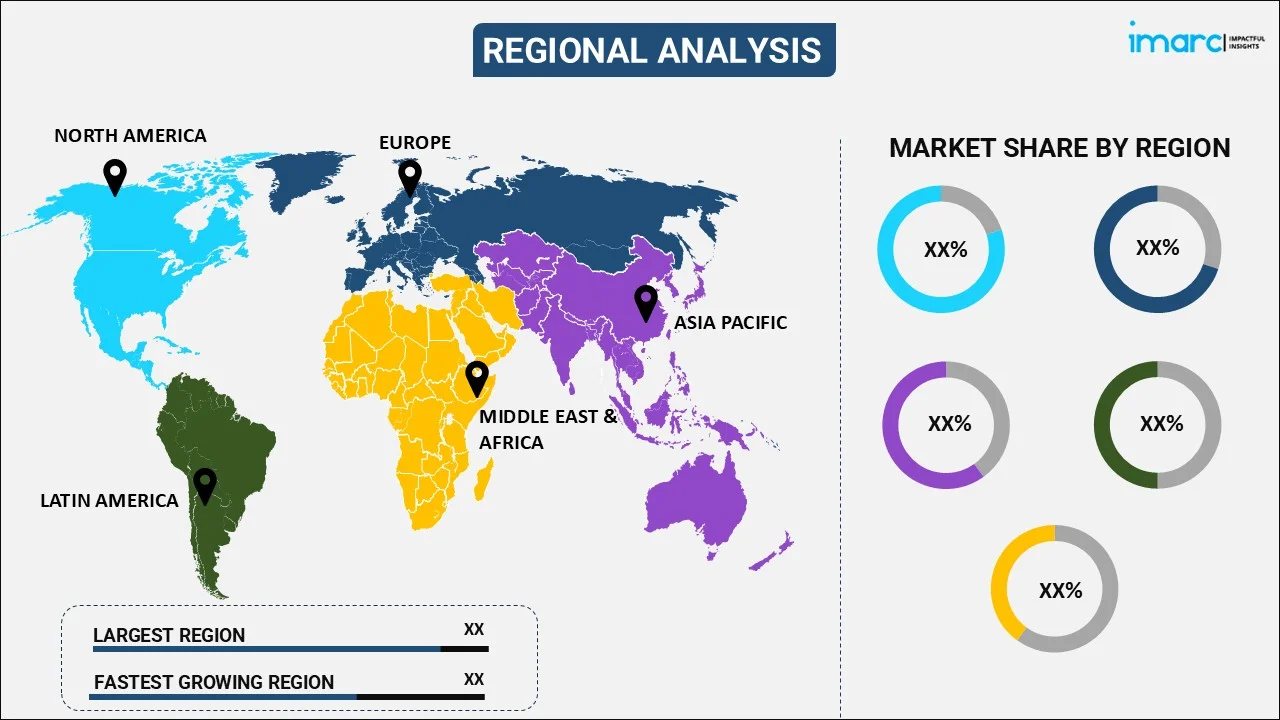
Fetal Bovine Serum Market Size, Share, Trends and Forecast by Product, Application, End User, and Region, 2025-2033
Fetal Bovine Serum Market Size and Share:
The global fetal bovine serum market size reached USD 1,054.7 Million in 2024. The market is projected to reach USD 1,651.2 Million by 2033, exhibiting a growth rate (CAGR) of 4.85% during 2025-2033. The market growth is attributed to rising demand for biotechnology and drug research, expanding cell culture uses, drug development advances, increasing investments in regenerative medicine, the broadening of vaccine production, and the increased utilization of FBS in clinical trials and personalized medicine.
Market Insights:
- North America dominated the fetal bovine serum market in 2024.
- On the basis of product, the charcoal stripped segment leads the market in 2024.
- Based on application, the biopharmaceuticals segment leads the market in 2024.
- On the basis of end users, the biotechnology and pharmaceutical companies segment leads the market in 2024.
Market Size & Forecast:
- 2024 Market Size: USD 1,054.7 Million
- 2033 Projected Market Size: USD 1,651.2 Million
- CAGR (2025-2033): 4.85%
- North America: Largest market in 2024
Fetal bovine serum (FBS) is a major component of animal cell culture media, which is obtained from bovine fetuses of cows. It has several nutritional and macromolecular factors that are essential for cell growth. Besides this, it also comprises amino acids, sugars, lipids, hormones, and low gamma globulin content. As a result, it is widely utilized in a range of applications, such as providing essential nutrients and facilitating cell survival and proliferation in eukaryotic cell culture. It is also used in research, manufacturing, biotech drugs, and controlling human and veterinary vaccines.

To get more information on this market, Request Sample
The market is propelled by the rising demand for high-quality serum in diagnostics, research, and pharmaceutical production. The growing biotechnology and pharmaceutical industries, combined with the increased emphasis on advanced therapeutic treatments, also enhance the market growth. Additionally, the advancements in serum-based research technologies and ongoing growth in biotechnology and life sciences are anticipated to raise market demand. Nonetheless, the FBS market has challenges regarding ethical issues of animal sourcing, regulatory barriers, and supply chain interruptions. These challenges that can be addressed are the development of substitutes for FBS. A research study published in May 2025 identified that milk whey can be used as a sustainable and efficient substitute for fetal bovine serum (FBS) in cell culture in the laboratory. Apart from this, researchers also seek novel ways to decrease the ethical footprint of sourcing, e.g., enhanced welfare standards in farm animal production.
Fetal Bovine Serum Market Trends:
FBS finds application in generating stem cells for treating patients suffering from acute and chronic lung damage due to coronavirus disease (COVID-19). In addition, as it contains growth factors and antibodies that can be utilized in laboratories to keep cells alive for dividing, growing, and evolving, it plays a pivotal role in various scientific research. This, along with significant growth in the research and development (R&D) activities on account of increasing funding by governing and private agencies to introduce novel biopharmaceuticals, is catalyzing the demand for FBS worldwide. Furthermore, the escalating demand for biopharma products on account of the growing prevalence of acute and chronic diseases is contributing to the growth of the market. Apart from this, the emerging trend of nuclear families and inflating income levels are positively influencing pet ownership and humanization, which is resulting in the increasing adoption of companion animals across the globe. This, along with the rising consumption of animal-derived products, is anticipated to fuel the need for FBS in veterinary diagnostics and vaccines to prevent infectious diseases around the world.
Key Market Segmentation:
IMARC Group provides an analysis of the key trends in each sub-segment of the global fetal bovine serum market report, along with forecasts at the global, regional and country level from 2025-2033. Our report has categorized the market based on product, application and end user.
Breakup by Product:

- Charcoal Stripped
- Chromatographic
- Dialyzed Fetal Bovine Serum
- Exosome Depleted
- Stem Cell
- Others
Charcoal stripped fetal bovine serum (FBS) leads the market in 2024, driven by its unique application in biomedical research and cell culture. Charcoal stripped FBS is treated with activated charcoal to eliminate steroid hormones, growth factors, and other small lipophilic molecules. It is especially of great importance in situations that demand hormone-sensitive conditions in studies. Charcoal stripped FBS is commonly used by researchers in endocrinology, cancer biology, and reproductive biology, where endogenous hormones present in regular FBS would interact with experimental results. Increased requirements for precision and control of experimental conditions, particularly in the pharmaceutical and biotechnological industries, have necessitated the use of charcoal stripped FBS. It is also crucial in nuclear receptor activity assays and hormone signaling pathways. Consequently, the niche product plays a major role in drug discovery improvements, toxicology assays, and cellular pathway research, as such a product is central in the premium segments of the FBS industry.
Breakup by Application:
- Biopharmaceuticals
- Cell Culture
- Human and Animal Vaccine Production
- Others
Biopharmaceuticals lead the market in 2024. The segment has widespread application in the development and manufacturing of drugs. FBS contains nutrients, growth factors, and hormones necessary for the proliferation and survival of cell lines employed in the manufacture of biopharmaceuticals. FBS is commonly used for the growth of mammalian cells in vaccine production, monoclonal antibody, and therapeutic protein manufacture. Growing needs for biologics, such as anticancer, autoimmune disease, and infection treatments, have driven the demand for high-quality cell culture media such as FBS. Additionally, its function in providing consistent and reproducible outcomes in industrial-scale manufacturing processes is a testament to its significance. With tightening regulatory requirements and the growth of the biopharmaceutical industry, the need for standardized, contamination-free, and ethically derived FBS remains on the rise, rendering biopharmaceutical applications a prevalent and high-margin driver of the total FBS market.
Breakup by End User:
- Biotechnology and Pharmaceutical Companies
- Academic Institutes
- Research Laboratories
- Others
Pharmaceutical and biotechnology companies lead the market in 2024 due to their heavy dependence on cell culture for manufacturing, development, and research. These firms widely utilize FBS as a supplement to growth in the growth of mammalian cells, which form the basis of making biologics, vaccines, and other high-end therapies. The presence of vital nutrients, hormones, and growth factors in FBS facilitates the maximum growth and well-being of sensitive cell lines, thus guaranteeing the quality and consistency of experimental and production results. In line with growing research and development (R&D) investments, particularly in the fields of regenerative medicine, monoclonal antibody production, and gene therapies, demand for high-quality FBS is steadily on the rise. In addition, the necessity of reproducible and scalable solutions to bioprocessing is responsible for the desire for well-characterized FBS products. Consequently, biotechnology and pharmaceutical industries remain central players in the growth and development of the global market.
Breakup by Region:

- North America
- United States
- Canada
- Asia-Pacific
- China
- Japan
- India
- South Korea
- Australia
- Indonesia
- Others
- Europe
- Germany
- France
- United Kingdom
- Italy
- Spain
- Russia
- Others
- Latin America
- Brazil
- Mexico
- Others
- Middle East and Africa
North America dominates the market in 2024 due to the high level of advanced biotechnology and pharmaceutical sectors in the region. The United States has a vast number of research and development (R&D) institutes, biopharmaceutical firms, and educational institutions that are heavily dependent on FBS for cell culture purposes in drug discovery, vaccine development, and biomedical research. Heavy research spending, robust regulatory systems, and well-developed healthcare infrastructure also support the huge demand for high-quality FBS in the region. In addition, the increasing trend toward personalized medicine and regenerative therapies further elevates the application of FBS in North America. The presence of major market players and suppliers guarantees constant availability and development of innovative products. North America is an integral hub for the consumption and emergence of FBS and a major driver of trends and technological developments in the global market.
Competitive Landscape:
The competitive landscape of the industry has also been examined along with the profiles of the key players being Atlas Biologicals Inc., Biological Industries (Sartorius AG), Bio-Techne Corporation, BioWest, Bovogen Biologicals Pty Ltd., General Electric Company, HiMedia Laboratories, Merck KGaA, PAN-Biotech, Rocky Mountain Biologicals, TCS Biosciences Ltd and Thermo Fisher Scientific Inc.
Latest News and Developments:
- On November 25, 2024, Gemini Bioproducts, LLC (“GeminiBio”) announced the acquisition of specific fetal bovine serum (FBS) product rights and related inventory from Bio-Techne, including the Optima, Premium Select, and Premium FBS brands. The strategic transfer ensures continuity of supply and preserves Bio‑Techne’s quality standards, leveraging GeminiBio’s cGMP manufacturing and global sales infrastructure. Effective December 2024, GeminiBio formally assumed all manufacturing and distribution responsibilities, reinforcing its position in the FBS market and delivering seamless access to established customers.
Report Coverage:
| Report Features | Details |
|---|---|
| Base Year of the Analysis | 2024 |
| Historical Period | 2019-2024 |
| Forecast Period | 2025-2033 |
| Units | Million USD |
| Segment Coverage | Product, Application, End User, Region |
| Region Covered | Asia Pacific, Europe, North America, Latin America, Middle East and Africa |
| Countries Covered | United States, Canada, Germany, France, United Kingdom, Italy, Spain, Russia, China, Japan, India, South Korea, Australia, Indonesia, Brazil, Mexico |
| Companies Covered | Atlas Biologicals Inc., Biological Industries (Sartorius AG), Bio-Techne Corporation, BioWest, Bovogen Biologicals Pty Ltd., General Electric Company, HiMedia Laboratories, Merck KGaA, PAN-Biotech, Rocky Mountain Biologicals, TCS Biosciences Ltd and Thermo Fisher Scientific Inc. |
| Customization Scope | 10% Free Customization |
| Post-Sale Analyst Support | 10-12 Weeks |
| Delivery Format | PDF and Excel through Email (We can also provide the editable version of the report in PPT/Word format on special request) |
Key Questions Answered in This Report
The global fetal bovine serum market was valued at USD 1,054.7 Million in 2024.
We expect the global fetal bovine serum market to exhibit a CAGR of 4.85% during 2025-2033.
The sudden outbreak of the COVID-19 pandemic has led to the growing adoption of fetal bovine serum to generate stem cells for treating the coronavirus-infected patients suffering from chronic lung damage.
The rising consumption of animal-derived products, along with increasing demand for fetal bovine serum in veterinary diagnostics and vaccines to prevent infectious diseases, is primarily driving the global fetal bovine serum market.
Based on the product, the global fetal bovine serum market can be categorized into charcoal stripped, chromatographic, dialyzed fetal bovine serum, exosome depleted, stem cell, and others. Currently, charcoal stripped accounts for the majority of the total market share.
Based on the application, the global fetal bovine serum market has been segregated into biopharmaceuticals, cell culture, human and animal vaccine production, and others. Among these, biopharmaceuticals currently hold the largest market share.
Based on the end user, the global fetal bovine serum market can be bifurcated into biotechnology and pharmaceutical companies, academic institutes, research laboratories, and others. Currently, biotechnology and pharmaceutical companies exhibit a clear dominance in the market.
On a regional level, the market has been classified into North America, Asia-Pacific, Europe, Latin America, and Middle East and Africa, where North America currently dominates the global market.
Some of the major players in the global fetal bovine serum market include Atlas Biologicals Inc., Biological Industries (Sartorius AG), Bio-Techne Corporation, BioWest, Bovogen Biologicals Pty Ltd., General Electric Company, HiMedia Laboratories, Merck KGaA, PAN-Biotech, Rocky Mountain Biologicals, TCS Biosciences Ltd, and Thermo Fisher Scientific Inc.
Need more help?
- Speak to our experienced analysts for insights on the current market scenarios.
- Include additional segments and countries to customize the report as per your requirement.
- Gain an unparalleled competitive advantage in your domain by understanding how to utilize the report and positively impacting your operations and revenue.
- For further assistance, please connect with our analysts.
 Request Customization
Request Customization
 Speak to an Analyst
Speak to an Analyst
 Request Brochure
Request Brochure
 Inquire Before Buying
Inquire Before Buying




.webp)




.webp)












